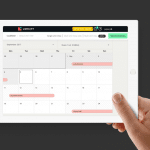Real estate is a great way to invest your hard-earned money. Purchasing a vacation rental presents an opportunity to make more money and build a business at the same time — especially now, at a time when the vacation rental business, sometimes referred to as the cottage industry, is booming. The global vacation rental market will reach $170 billion by 2019, according to Research and Markets.
If you’re ready to get in as this new industry grows, keep these five simple (yet important!) steps in mind.
1. Set goals
Before looking at potential properties (and after you’ve been pre-approved and handled the first few rounds of financial paperwork), ask yourself: what is the goal of this rental property? If the main goal is to bring in extra income, be more specific: how much do you want to make monthly? What about annually? When it comes time to determine the potential financial opportunity, you’ll be clear on what makes sense for you and what doesn’t.
Mark J. Kohler, real estate investor and business and financial expert, suggests also setting a deadline to keep you on track with what can be a time-consuming process:
“Set a deadline to purchase your first rental. Stay committed. Let friends and family know your goal. Write it down and set short deadlines to be looking at property and making decisions, rather than just ‘buy rental by X date’. Set more manageable goals to get you to closing.”
2. Research the value of the home
When you find a few potential rentals you like, spend time researching the value of the home, both financially and logistically. Financially, there are a few ways you can assess the value:
Home Value Estimator: This tool uses its own proprietary machine learning algorithm to give you a home value estimate based on the estimates of five leading sources. This will allow you to determine if the property is over-priced, under-priced or right on the mark.
Statewide Home Values: If you don’t have a particular area or neighborhood in mind, but you know the state where you want to buy a rental, use this tool from Bankrate. With it, you can see what properties are going for, on average, by state.
In terms of logistics, keep the following in mind: “Is it attractive for tenants? Is there demand? How is the infrastructure around? Is it getting overcrowded? What are average prices? Are prices on the rise?” suggests Daniela Andreevska, for Mashvisor.
Don’t forget to look at crime rates and even the walk score, the latter of which may be attractive to active renters who prefer to walk rather than drive — or for those who don’t want to spend money on a car rental.
3. Determine the financial opportunity
Before purchasing a vacation rental property, and assuming that you’ll make money no matter what, do the math to get an estimate the earning potential. Use this simple calculator from Rented.com, where you can input average occupants, average rental term (allowing you to specify a few days, rather than traditional rentals which are typically be 6 to 12 months) and rate.
Don’t forget to subtract your mortgage payment to see what you’d walk away with (or put back into the house) each month.
This math will allow you to rule out properties that don’t fit with the financial goals you’ve set. When you have a lot of options, this is a simple way to eliminate and focus on the properties that have the most potential value.
4. Assess potential upkeep and maintenance costs
Owning a rental property will take the same amount of upkeep and maintenance as your own home — if not more. Not only do you need to take into consideration general deep-cleaning tasks such as drain unclogging and paint touch-ups, you will also need to bear in mind renovations regarding new technologies like smart locks and app-controlled heating and air conditioning (amongst other inventions) – which will all come with a price tag.
Luckily, there are a few simple ways to estimate these costs, according to Brandon Turner of Bigger Pockets:
- Ask local property managers: What are common upkeep issues they deal with regularly? Depending on where the property is, you may be dealing with weather-related upkeep as well. Think: lakeside, oceanside or mountainside.
- Call local companies and agencies: Not sure how high typical heating bills are? What about the water bill? Call the local company or agency in charge, as they can likely give you an average cost.
5. Weigh up the risks
Found the perfect rental? Don’t sign the paperwork just yet. First, weigh up any potential risks that come with owning a rental property. Dana Anspach, a financial expert, suggests considering the following potential risks:
- Your property may sit empty between renters, which could lower your overall return
- In the case you need to evict a bad guest, you may incur some legal expenses
- Should a guest cause damage to your property, you could incur excess repair costs.
While not all risks are avoidable — like having a water heater break all of a sudden — some can be mitigated with the right paperwork. Check out our sample rental agreement and read about short term lease agreements (perfect for vacation rentals) at LegalTemplates.com.
Bonus tip! Start the process
Use these tips to ensure you get the most out of the vacation rental you buy. Get the right contracts in place, set goals, and assess financial opportunity so you can be educated as you research your options and look at properties. In the end, the experience of buying and managing will be as stress-free as possible and you’ll find a lucrative opportunity that will pay off as the cottage industry grows.
About the Author



